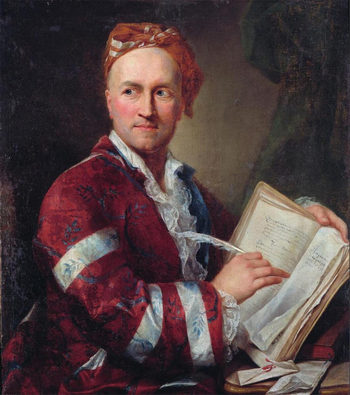Material World – Nation or class?
Nationalist sentiment was the form of collective consciousness that emerged as the one best adapted or suited to the needs of capitalism. The nation-state, after all, constitutes the most fundamental unit of spatial organisation from the standpoint of the accumulation of capital and the coalescence of capitalist interests into separate and competing groupings – namely national groupings whose interests the state broadly serves as the primary source of state income in the form of taxation.
Furthermore, as capitalism´s collectivist expression par excellence, nationalism neatly complemented individualist ideology. Indeed, nation-states were themselves thought of as quasi-individuals, and so it became possible to think of something so abstract and amorphous as a ‘nation’ as possessing a particular character and evincing certain ‘traits’. In short, the nation came to be ‘naturalised’ and rendered timeless in nationalist mythology.
 The 18th century Swiss jurist, Emerich Vattel, author of The Law of Nations (1758), defined nation-states as ‘bodies politic, societies of men united together for the purpose of promoting their mutual safety and advantage by the joint efforts of their combined strength’. In legal terms, the nation-state amounted to a ‘moral person’. As Vattel put it: ‘Such a society has her affairs and her interests; she deliberates and takes resolutions in common; thus becoming a moral person who possesses an understanding and a will peculiar to herself and is susceptible of obligations and rights’.
The 18th century Swiss jurist, Emerich Vattel, author of The Law of Nations (1758), defined nation-states as ‘bodies politic, societies of men united together for the purpose of promoting their mutual safety and advantage by the joint efforts of their combined strength’. In legal terms, the nation-state amounted to a ‘moral person’. As Vattel put it: ‘Such a society has her affairs and her interests; she deliberates and takes resolutions in common; thus becoming a moral person who possesses an understanding and a will peculiar to herself and is susceptible of obligations and rights’.
In short, the ‘nation’ has pre-existing moral claims on the citizens who comprise it, claims which also work to ensure the compliance of those citizens to the capitalist mode of production that gave birth to this very concept of nationhood,

It was in the 19th century that nationalism became particularly significant and influential although, of course, it had been gradually building up to this point in preceding centuries. Benedict Anderson in his seminal work, Imagined Communities: Reflections on the Origin and Spread of Nationalism (1983), describes the origins of the nation-state as lying in capitalism itself and particularly ‘print capitalism’ – a reference to the spread of literacy in the modern world that allowed people to ‘imagine’ themselves to be part of a much wider community in the guise of the ‘nation’. Greater mobility and improved transport links would also have contributed to this development.
No doubt there were many other factors besides these implicated in the rise of 19th century nationalism, but what is relevant here is the impact of nationalist ideology on popular consciousness – the point being that nationalism served as a kind of glue that bound people together in a modern capitalist society in the way that religion had in traditional society. Being a secular religion its devotees paid homage to, and worshipped at the feet of, this abstraction called the ‘nation’. Indeed, religion itself was pressed into the service of nations, the latter’s armies being blessed by the priests as they embarked on some holy war against some other nation. Confusingly, God always appeared to be on every side engaged in the bloody business of warmongering
Any functioning society, even the most ruggedly individualist of them, needs some kind of collectivist substratum to hold it together. However, while nationalism was pre-eminent in performing this particular role in a capitalist society it was far from being the only conceivable form of collectivist sentiment that might arise in this society; ‘class consciousness’ was another.
Marx wrote much about the changing circumstances of early capitalism and how the rise of the factory system, along with the concentration of large numbers of workers this brought about in the rapidly expanding urban centres, fostered a growing sense of class identity. This identity came to be forged out of the realisation of a common class interest in opposition to the interests of the owners of capital, and expressed itself in various ways – most notably in the rise of an organised trade union movement.
However, with hindsight it seems clear that Marx gravely underestimated the strength and potency of nationalist ideology and its ability to constitute itself as a kind of overarching value framework that can encompass, co-opt and subsume all other forms of collectivist expression, including ‘class consciousness’. Belief in nationalism of any kind and the existence of some supposed overriding ‘national interest’ (including, it should be noted, the Left´s endorsement of ‘national liberation’ and a programme of ‘nationalisation’) has the obvious effect of blunting the class struggle of the working class against the capitalist class and blurring the distinction between the classes and their diametrically opposed interests in this struggle.
We can see how this, in turn, is likely to have had a seriously retarding influence on the goal of establishing a post-capitalist society. Such a society must necessarily entail the complete removal of class monopoly ownership and control of the productive forces of society. Needless to say, this is something that will naturally be resisted by the class that exercises that monopoly – the tiny capitalist or ruling class. Consequently, the very objective of getting rid of capitalism inescapably has to oppose nation and nationalism and promote class and class consciousness – a post-capitalist society being, by definition, a classless society.
ROBIN COX
